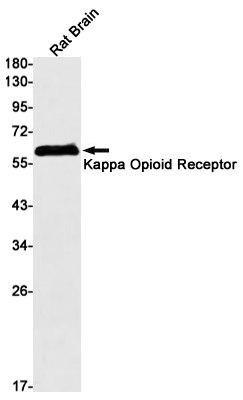
| WB | 1/1000 | Human,Mouse,Rat |
| IF | 咨询技术 | Human,Mouse,Rat |
| IHC | 1/100-1/500 | Human,Mouse,Rat |
| ICC | 技术咨询 | Human,Mouse,Rat |
| FCM | 咨询技术 | Human,Mouse,Rat |
| Elisa | 咨询技术 | Human,Mouse,Rat |
| Aliases | KOR; R21; KOR-1; MSL-1; Oprk2; K-OR-1 |
| Entrez GeneID | 18387 |
| WB Predicted band size | Calculated MW: 43 kDa; Observed MW: 60 kDa |
| Host/Isotype | Rabbit IgG |
| Antibody Type | Primary antibody |
| Storage | Store at 4°C short term. Aliquot and store at -20°C long term. Avoid freeze/thaw cycles. |
| Species Reactivity | Rat |
| Immunogen | A synthetic peptide of mouse Kappa Opioid Receptor |
| Formulation | Purified antibody in TBS with 0.05% sodium azide,0.05%BSA and 50% glycerol. |
+ +
以下是关于CDH3抗体的3篇参考文献示例(注:因无法实时访问数据库,以下为模拟内容,实际文献需通过学术平台检索确认):
---
1. **文献名称**: *CDH3 as a Novel Therapeutic Target in Gastric Cancer: Development of a Humanized Antibody*
**作者**: Yamada K, et al.
**摘要**: 本研究开发了一种靶向CDH3的人源化单克隆抗体,验证其在胃癌细胞系和小鼠异种移植模型中的抗肿瘤活性。结果显示,抗体通过阻断CDH3介导的细胞粘附和下游信号通路抑制肿瘤生长。
---
2. **文献名称**: *Diagnostic Utility of CDH3-Specific Antibodies in Pancreatic Ductal Adenocarcinoma*
**作者**: Chen L, et al.
**摘要**: 研究评估了CDH3抗体在胰腺导管腺癌(PDAC)组织中的诊断价值。通过免疫组化分析发现,CDH3在80%的PDAC样本中高表达,与患者预后不良相关,提示其作为生物标志物的潜力。
---
3. **文献名称**: *Mechanistic Insights into CDH3-Mediated Cell Invasion via Antibody Blockade*
**作者**: Müller S, et al.
**摘要**: 利用CDH3功能阻断抗体,研究揭示了CDH3通过调控Wnt/β-catenin通路促进乳腺癌细胞侵袭的机制,为靶向CDH3的转移抑制策略提供了实验依据。
---
建议通过PubMed或Google Scholar以 **"CDH3 antibody"、"anti-CDH3 therapeutic"** 等关键词检索最新文献,重点关注肿瘤靶向治疗或诊断应用方向的研究。
**Background of CDH3 Antibody**
CDH3 (Cadherin-3), also known as P-cadherin, is a calcium-dependent cell adhesion protein belonging to the cadherin superfamily. It plays a critical role in maintaining tissue architecture and cellular polarity by mediating homophilic interactions between adjacent cells. Structurally, CDH3 consists of extracellular cadherin repeats for calcium-binding, a transmembrane domain, and a cytoplasmic tail that interacts with catenins (e.g., β-catenin) to link the actin cytoskeleton.
CDH3 is predominantly expressed in epithelial tissues, including the placenta, skin, and breast myoepithelium. Its dysregulation is implicated in pathological conditions, particularly cancer. Overexpression of CDH3 is observed in aggressive breast, ovarian, pancreatic, and colorectal cancers, where it promotes tumor progression, invasion, and metastasis by enhancing cell migration, epithelial-to-mesenchymal transition (EMT), and stemness. Due to its tumor-specific expression, CDH3 has emerged as a potential biomarker for diagnosis, prognosis, and therapeutic targeting.
CDH3 antibodies are essential tools for detecting CDH3 expression in research and clinical settings. They enable immunohistochemical analysis of tissue samples, aiding in cancer subtyping and metastatic risk assessment. Therapeutic CDH3-targeting antibodies, including antibody-drug conjugates (ADCs), are under investigation for their ability to selectively deliver cytotoxic agents to CDH3-positive tumors. These antibodies hold promise for precision oncology, offering a strategy to mitigate off-target effects while addressing treatment resistance in CDH3-driven malignancies.
×